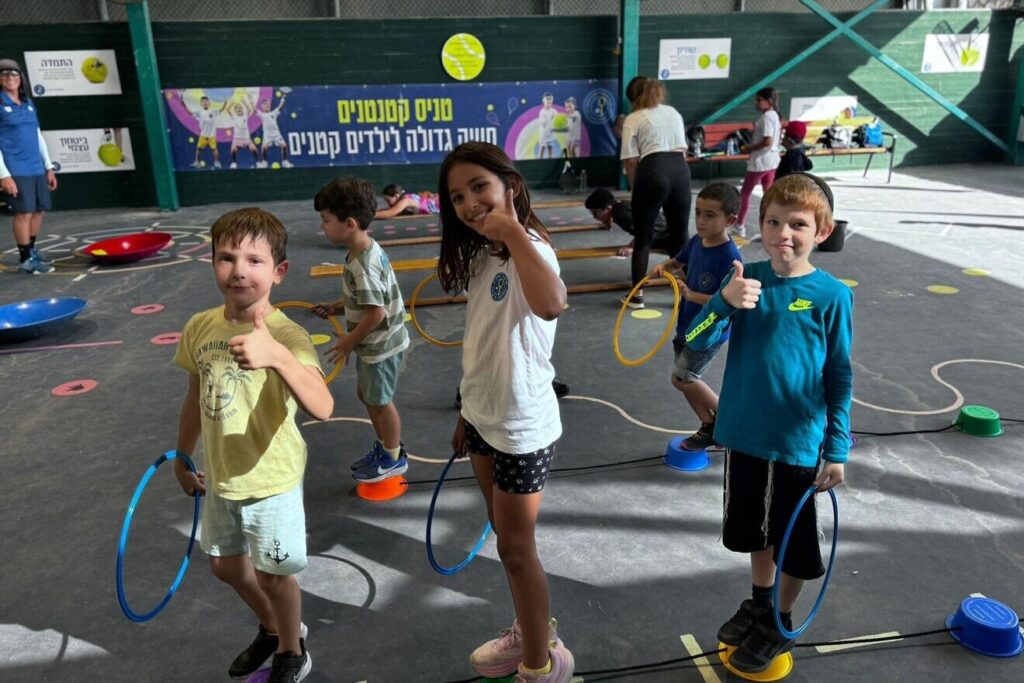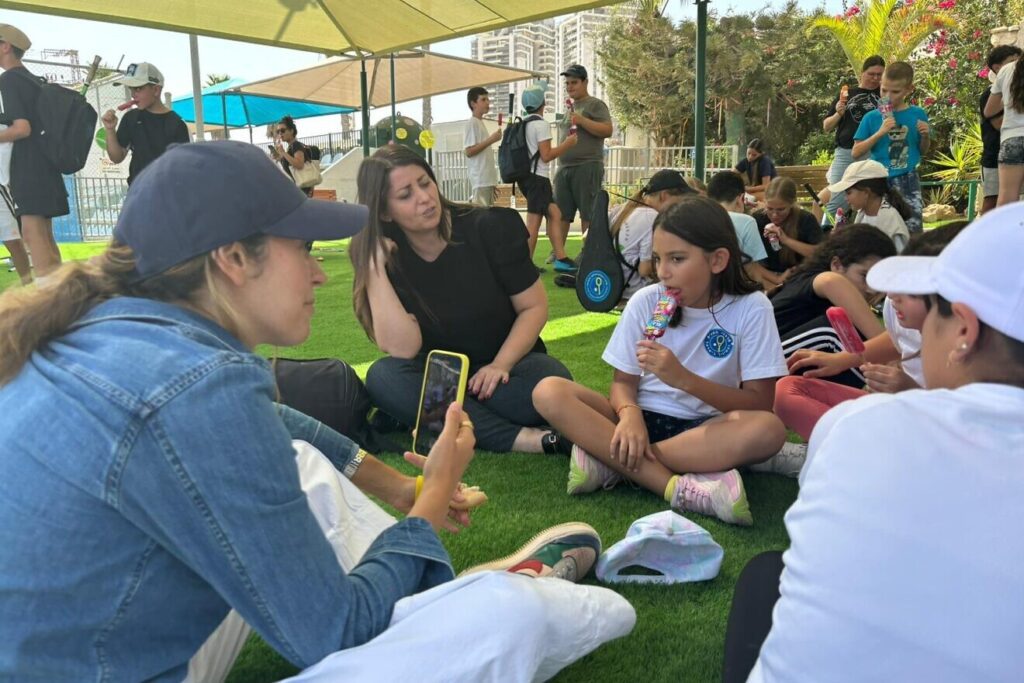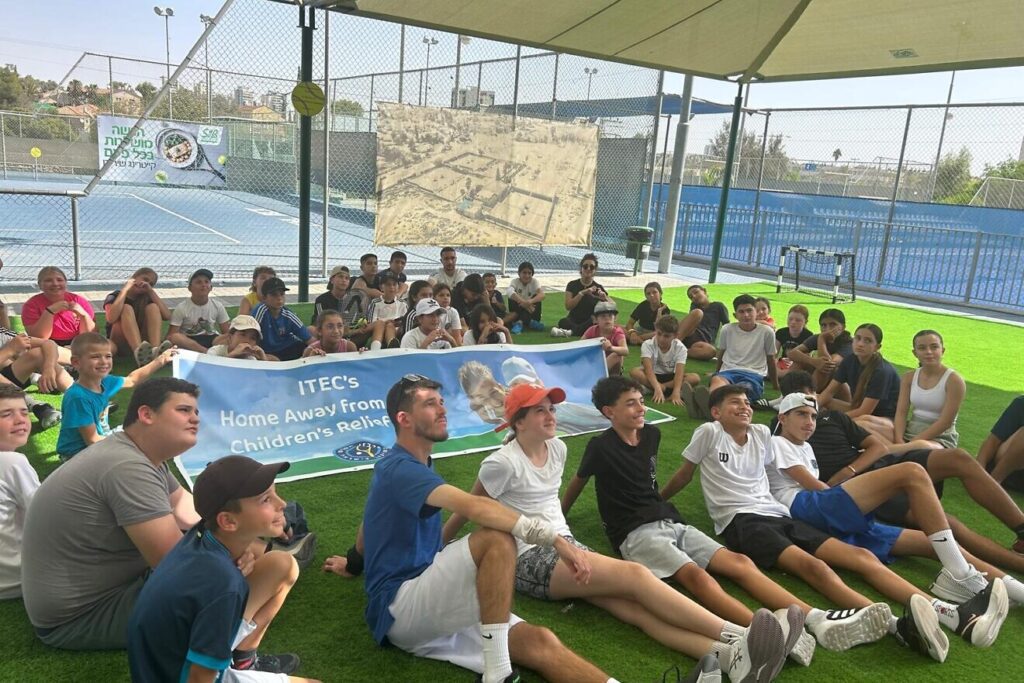“My son lives and breathes tennis. He couldn’t play for a while because of the war situation. When he got here and played again, his eyes were filled with happiness,” Shiran Tzuberi from Acre told JNS on Monday.
Fifty children from communities in northern Israel—Acre, Nahariya and the Druze town of Sajur—arrived at the Israel Tennis and Education Center (ITEC) branch in Beersheva to take part in ITEC’s “Home away from Home” three-day tennis camp. They participated in tennis training sessions, leisure activities and mingled with children from the south.
“We are grateful to our dedicated donors, whose unwavering support makes this possible. They genuinely care about creating safe spaces where kids can feel supported and valued,” Ilan Allali, ITEC’s Foundation CEO and Global CFO, told JNS.
“Mental health is a cornerstone of everything we do, and our programs are designed not only to teach tennis skills but also to nurture resilience, confidence and hope. Together, we are building a brighter future for these children,” he added.

Children traversed most of the country by bus with their coaches, and stayed at the Leonardo Hotel in Beersheva. In addition to tennis sessions, they took part in activities, such as going to the theater, bowling and video games. The group included Jewish, Druze, Muslim and Christian children.
“Twelve years ago, during the IDF’s ‘Operation Pillar of Defense,’ when the situation in the south was bad, we sent about 100 kids from Beersheva to Haifa. We received overwhelmingly positive feedback. The kids enjoyed normal life, while their friends were in bomb shelters,” Yaniv Sakira, the manager of the Beer Sheva tennis center, told JNS.
“Now the situation in the north has worsened and the tennis centers there are closed. I told the ITEC management that we would be happy to have those kids over and do something special for them,” he continued.
“Sure, they still get air-raid alarms on their phones. You can’t run from it. But when they are active, whether it’s playing tennis or watching a movie, it clears their heads a bit. This is what we try to do—give them a feeling of safety for three days,” Sakira added.
To promote resilience, the program includes mental coaching sessions.

“It’s very challenging to keep them focused and in a relaxed mood for an extended period. Our sessions are about 45 minutes long. It’s difficult for them to sit and concentrate throughout the course,” said Asaf Barel, a mental health coach, who leads sessions at eight tennis centers.
“The kids keep a lot of their feelings inside. You have to be very patient and compassionate. We can sometimes see a switch in their emotions within a split second. They can go from being calm to very upset,” he said.
“There’s a lot of conflict at home as well. Some kids used to sleep in their own rooms and now the whole family has been sleeping together for months,” he added.
In one exercise, the children had to pop balloons to win a prize and inside each balloon were questions relating to their state of mind and feelings about the situation.
“They were eager to pop the balloons and answer questions to get the prize. They were very cooperative and shared their thoughts,” Barel said.

“Sometimes I ask them how many times they think they can jump on one leg. Most of the time, they underestimate themselves and we show them that the ceiling, if there is one, is higher than they think,” he continued.
“It’s all about building confidence and believing in themselves. They are under a lot of stress and they don’t show it. I think in a few years all the stress will start popping out and I don’t know that we are ready for it,” he added.
Coach Ronen Morali led a tennis training session with kids from Sajur and Beersheva when we arrived at the camp.
“What I like about kids from the periphery is how warm they are, even though they are closed off and very stressed because of what they’ve experienced in the past two months. In the beginning, they were tense but now they are more relaxed,” Morali told JNS after the session.
“Tennis is the best way to give the kids the kind of peace and quiet they need. It’s a sport that teaches you how to synergize and communicate with your opponent. Communication right now is one of the biggest challenges in Israel,” he said.
“People don’t communicate, they fight against each other. Tennis is a great tool for kids to learn how to listen and respect one another,” he added.
Alam Ibrahim, the Druze manager of ITEC’s Sajur branch, accompanied 12 Muslim, Christian and Druze children from his town, including his daughter, eight-year-old Tia Ibrahim.
“We wanted to take these kids away from the alarms, the shelling and the atmosphere of war, enhance their resilience and share with them on the tennis field,” Ibrahim told JNS.
“While the cultures are different, we know how to unite the kids through sport, especially on the tennis field. Our vision does not differentiate between skin or hair color. We are all together. It warms the heart to see a religious Jewish kid play with an Arab girl, there is hope in that,” he said.
Ibrahim spoke of the tragedy that struck the Druze town of Majdal Shams on the Golan Heights in July when a Hezbollah missile hit a soccer field, killing 12 children.
“Some of the children that were murdered played tennis with us. Twelve worlds ended because terrorists decided to shoot a missile. We are all in the same boat. We are in a rough sea, we either gather together and bring the ship to safer waters or we lose hope,” Ibrahim said.
Lilo Tzarfati, COO of ITEC, stressed the challenge of getting children out of their houses and into a bus.
“The biggest fear for the parents is the safety of their children. We ensure their security for everything from the bus to the tennis training sessions and the hotel stay. The kids for us are the priority,” Tzarfati told JNS.
“What drives us is how to raise the next generation and strengthen the values we want to instill in the children. The last crisis was COVID. We had to train kids remotely, or come to their neighborhood. Now it’s the war, it pushes us to reinvent ourselves every time,” he added.
Oshrat Cohen from Acre, the mother of 13-year-old Yair, accompanied her son on the trip.
“I was afraid to send my kid alone so far from home during the complex situation we are in. Right now, the problem is only in the north, but we can’t know how it will develop,” Cohen told JNS.
“Kids need to get respite from a war routine to a sane routine; meet other children in person and not through Zoom—while doing what they love, playing tennis,” she continued.
“In these times, we need to do more of this and those who made these training camps possible have all my respect. We don’t take it for granted. Everyone is giving what they can to make our children’s lives better,” she added.
